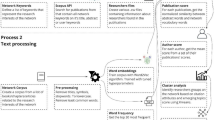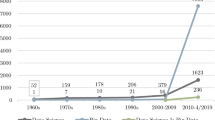Abstract
Much of the research conducted in Africa that can address social and economic challenges on the continent remains invisible when using standard bibliometric databases because these fail to capture research outputs that are in local languages or published in local journals. We turn to academic networking sites as data sources to uncover research outputs of sub-Saharan African countries to provide a fuller picture of the research activity in the region. We map computer science research productivity and collaboration in sub-Saharan Africa using traditional bibliometric databases (Scopus and Web of Science) and an alternative data source: Academia.edu. This alternative data source reveals additional research to that found in the bibliometric databases and provides insights into publication and collaboration patterns. We found 761 unique records not indexed in the bibliometric databases, constituting 6% of all the computer science research output for the region. These records were mostly articles in local and regional journals. We also found a higher percentage of regional collaborations. The top five countries for computer science research outputs in sub-Saharan Africa (excluding South Africa) using both traditional bibliometric and alternative data sources were Nigeria, Kenya, Sudan, Ghana, and Mauritius. We conclude that utilizing only traditional bibliometric databases for mapping computer science research activity in sub-Saharan Africa provides an incomplete picture of the research happening in this region. Using academic networking sites as data sources, despite being labor intensive and having other limitations, can help to fill in some of the gaps.






Similar content being viewed by others
References
Abdulhayoglu, M. A., & Thijs, B. (2018). Use of locality sensitive hashing (LSH) algorithm to match Web of Science and Scopus. Scientometrics, 116(2), 1229–1245.
Abrahams, L., Burke, M., Gray, E., & Rens, A. (2008). Opening Access to Knowledge in Southern African Universities. SARUA Study Series, Johannesburg: Southern African Regional Universities Association. Retrieved April 10, 2020 from http://www.sarua.org/files/publications/OpeningAccess/Opening_Access_Knowledge_2008.pdf.
Adams, J., Gurney, K., Hook, D., & Leydesdorff, L. (2014). International collaboration clusters in Africa. Scientometrics, 98(1), 547–556.
Adebayo, O. (2013). Science research and publication in Africa: The Nigeria Perspective. The African Journal of Plant Science and Biotechnology, 7(1), 106–109.
Aravanitis, R., Waast, R., & Gaillard, J. (2000). Science in Africa: A scientometric panorama using PASCAL database. Scientometrics, 47(3), 457–473.
Archambault, E., Vignola-gagne, E., Cote, G., Lariviere, E., & Gingras, Y. (2006). Benchmarking scientific output in the social sciences and humanities: The limits of existing databases. Scientometrics, 68(3), 329–342.
Asubiaro, T. (2019). How collaboration type, publication place, funding and author’s role affect citations received by publications from Africa: A bibliometric study of LIS research from 1996 to 2015. Scientometrics, 120, 1261–1287.
Asubiaro, T., & Badmus, O. M. (2020). Collaboration clusters, interdisciplinarity, scope and subject classification of library and information science research from Africa: An analysis of Web of Science publications from 1996 to 2015. Journal of Librarianship and Information Science. https://doi.org/10.1177/0961000620907958.
Bakri, A., & Willett, P. (2011). Computer science research in Malaysia: A bibliometric analysis. Aslib Proceedings, 63(2/3), 321–335.
Beaudry, C., Mouton, J., & Prozesky, H. (Eds.). (2018). The Next Generation of Scientists in Africa. Cape Town: African Minds.
Boshoff, N. (2009). Neo-colonialism and research collaboration in Central Africa. Scientometrics, 81(2), 413–434.
Boshoff, N. (2010). South-South research collaboration of countries in the Southern African Development Community (SADC). Scientometrics, 84(2), 416–434.
Butler, L. (2008). ICT assessment: Moving beyond journal outputs. Scientometrics, 74(1), 39–55.
Confraria, H., Blanckenberg, J., & Swart C. (2020). Which factors influence international research collaboration in Africa? In Ramutsindela M., & Mickler D. (Eds.) Africa and the Sustainable development goals. Sustainable development goals series (pp. 243–255). Cham, Switzerland: Springer.
Confraria, H., & Godinho, M. M. (2015). The impact of African science: A bibliometric analysis. Scientometrics, 102(2), 1241–1268.
Duffy, B.E., & Pooley, J.D. (2017). “Facebook for Academics”: The convergence of self-branding and social media logic on Academia.edu. Social Media + Society, January–March, 1–11.
Eduan, W., & Yuanqun, J. (2019). Patterns of the China–Africa research collaborations from 2006 to 2016: A bibliometric analysis. Higher Education, 77(6), 979–994.
Franceschet, M. (2010). The role of conference publications in CS. Communications of the ACM, 53(2), 129–132.
Freyne, J., Coyle, L., Smyth, B., & Cunningham, P. (2010). Relative status of journal and conference publications in computer science. Communications of the ACM, 53(11), 124–132.
Gauffriau, M., & Larsen, P. O. (2005). Counting methods are decisive for rankings based on publication and citation studies. Scientometrics, 64(1), 85–93.
Gauffriau, M., Larsen, P. O., Maye, I., Roulin-Perriard, A., & Von Ins, M. (2008). Comparisons of results of publication counting using different methods. Scientometrics, 77(1), 147–176.
Gavel, Y., & Iselid, L. (2008). Web of Science and Scopus: A journal title overlap study. Online Information Review, 32(1), 8–21.
Goodrum, A., McCain, K., Lawrence, S., & Giles, C. L. (2001). Scholarly publication in the internet age: A citation analysis of computer science literature. Information Processing and Management, 57(2), 661–675.
Harsh, M., & Zachary, G. P. (2013). Computer science research capacity as a driver of ICTD innovation: institutional factors in Kenya and Uganda. Internet and Communication Technology for Development 2013 Proceedings, ACM 978-1-4503-1907-2/13/12.
Harsh, M., Bal, R., Wetmore, J., Zachary, G. P., & Holden, K. (2018). The rise of computing research in East Africa: The relationship between funding, capacity and research community in a nascent field. Minerva, 56(1), 35–58.
Harsh, M., Holden, K., Wetmore, J., Zachary, G. P., & Bal, R. (2019). Situating science in Africa: The dynamics of computing research in Nairobi and Kampala. Social Studies of Science, 49(1), 52–76.
Jamali, H. R., Nicholas, D., & Herman, E. (2016). Scholarly reputation in the digital age and the role of emerging platforms and mechanisms. Research Evaluation, 5(1), 37–49.
Katz, J. S., & Martin, B. R. (1997). What is research collaboration? Research Policy, 26(1), 1–26.
Kim, J. (2019). Author-based analysis of conference versus journal publication in computer science. Journal of the Association for Information Science and Technology, 70(1), 71–82.
Laudel, G. (2002). What do we measure by co-authorships? Research Evaluation, 11(1), 3–15.
Lisée, C., Larivière, V., & Archambault, E. (2008). Conference proceedings as a source of scientific information: A bibliometric analysis. Journal of the American Society for Information Science and Technology, 59(11), 1776–1784.
Martín-Martín, A., Orduna-Malea, E., Thelwall, M., & Delgado López-Cózar, E. (2018). Google Scholar, Web of Science, and Scopus: a systematic comparison of citations in 252 subject categories. Journal of Informetrics, 12(4), 1160–1177.
Mas-Bleda, A., Thelwall, M., Kousha, K., & Aguillo, I. F. (2014). Do highly cited researchers successfully use the social web? Scientometrics, 101(1), 337–356.
Megnigbeto, E. (2013a). International collaboration in scientific publishing: the case of West Africa (2001–2010). Scientometrics, 96(3), 761–783.
Megnigbeto, E. (2013b). Scientific publishing in West Africa: Comparing Benin with Ghana and Senegal. Scientometrics, 95(3), 1113–1139.
Meneghini, R. (2012). Emerging journals. EMBO Reports, 13, 106–108. https://doi.org/10.1038/embor.2011.252.
Meyer, B., Choppy, C., van Leeuwen, J., & Staunstrup, J. (2009). Research evaluation for computer science. Communications of the ACM, 52(4), 31–34.
Molla, T., & Cuthbert, D. (2016). In pursuit of the African PhD: A critical survey of emergent policy issues in select Sub-Saharan African nations, Ethiopia, Ghana and South Africa. Policy Futures in Education, 14(6), 635–654.
Mongeon, P., & Paul-Hus, A. (2016). The journal coverage of Web of Science and Scopus: A comparative analysis. Scientometrics, 106(1), 213–228.
NEPAD (2014). African Innovation Outlook II. Pretoria: NPCA. Retrieved April 10, 2020 from https://www.nepad.org/publication/african-innovation-outlook-ii.
Neylon, C., Willmers, M., & King, T. (2014). Illustrating impact: Applying altmetrics to Southern African research. Scholarly Communication in Africa Programme (SCAP) Brief No. 1 for the International Development Research Centre, January 2014, University of Cape Town. Retrieved April 10, 2020 from https://open.uct.ac.za/bitstream/handle/11427/2316/SCAP_Neylon_IllustratingImpact_2014.pdf?sequence=1&isAllowed=y.
Onyancha, O. B. (2015). Social media and research: an assessment of the coverage of South African universities in ResearchGate, Web of Science and the Webometrics Ranking of World Universities. South African Journal of Libraries and Information Science, 81(1), 8–20.
Onyancha, O. B., & Maluleka, J. R. (2011). Knowledge production through collaborative research in sub-Saharan Africa: How much do countries contribute to each other’s knowledge output and citation impact? Scientometrics, 87(2), 315–336.
Owusu-Nimo, F., & Boshoff, N. (2017). Research collaboration in Ghana: Patterns, motives and roles. Scientometrics, 110(3), 1099–1121.
Pouris, A. (2010). A scientometric assessment of the Southern Africa Development Community: Science in the tip of Africa. Scientometrics, 85(1), 145–154.
Pouris, A., & Ho, Y. S. (2014). Research emphasis and collaboration in Africa. Scientometrics, 98(3), 2169–2185.
Scott, D., & Swanepoel, M. (2018). Canadian and South African scholars’ use of institutional repositories, ResearchGate, and Academia.edu. Partnership: The Canadian Journal of Library and Information Practice and Research. https://doi.org/10.21083/partnership.v13i1.4137.
Singh, V. K., Uddin, A., & Pinto, D. (2015). Computer science research: The top 100 institutions in India and in the world. Scientometrics, 104(2), 529–553.
Stewart, B. (2015). In abundance: Networked participatory practices as scholarship. International Review of Research in Open & Distributed Learning, 16(3), 318–340.
Subramanyam, K. (1983). Bibliometrics studies of research collaboration: A review. Journal of Information Science, 6(1), 33–44.
Thelwall, M., & Kousha, K. (2014). Academia.edu: Social network or academic network? Journal of the Association for Information Science and Technology, 65(4), 721–731.
Tijssen, R. J. W. (2007). Africa’s contribution to the worldwide research literature: New analytical perspectives, trends and performance indicators. Scientometrics, 71(2), 303–327.
Tijssen, R. J. W., Mouton, J., Van Leeuwen, T. N., & Boshoff, N. (2006). How relevant are local scholarly journals in global science? A case study of South Africa. Research Evaluation, 15(3), 163–174.
Toivanen, H., & Ponomariov, B. (2011). African regional innovations systems: Bibliometric analysis of research collaboration patterns 2005–2009. Scientometrics, 88(2), 471–493.
Uddin, A., Singh, V. K., Pinto, D., & Olmos, I. (2015). Scientometric mapping of computer science research in Mexico. Scientometrics, 105(1), 97–114.
Uthman, O. A. (2010). Patterns and determinants of HIV research productivity in sub-Saharan Africa: Bibliometric analysis of 1981 to 2009 PubMed papers. BMC Infectious Diseases, 10(1), 47.
Van Leeuwen, T. N. (2004). Descriptive versus evaluative bibliometrics. In H. F. Moed (Ed.), Handbook of quantitative science and technology research: The use of publication and patent statistics in studies of S&T systems (pp. 373–388). Dordrecht: Kluwer Academic Publisher.
Veletsianos, G., & Kimmons, R. (2012). Networked participatory scholarship: Emergent technocultural pressures toward open and digital scholarship in online networks. Computers & Education, 58(2), 766–774.
Wainer, J., Eckmann, M., Goldenstein, S., & Rocha, A. (2013). How productivity and impact differ across computer science subareas. Communications of the ACM, 56(8), 67. https://doi.org/10.1145/2492007.2492026.
Wainer, J., & Valle, E. (2013). What happens to computer science research after it is published? Tracking CS research lines. Journal of the American Society for Information Science and Technology, 64(6), 1104–1111.
Wainer, J., Xavier, E. C., & Bezerra, F. (2009). Scientific production in Computer Science: A comparative study of Brazil and other countries. Scientometrics, 81(2), 535–547.
World Bank. (2014). A decade of development in sub-Saharan Africa science, technology, engineering and mathematics research. Washington, DC: World Bank Group. Retrieved April 10, 2020 from, http://documents.worldbank.org/curated/en/237371468204551128/A-decade-of-development-in-sub-Saharan-African-science-technology-engineering-and-mathematics-research.
Yan, W., & Zhang, Y. (2018). Research universities on the ResearchGate networking site: An examination of institutional differences, research activity level, and social networks. Journal of Informetrics, 12(1), 385–400.
Zdravkovic, M., Chiwona-Karltun, L., & Zink, E. (2016). Experiences and perceptions of South-South and North-South scientific collaboration of mathematicians, physicists and chemists from five southern African universities. Scientometrics, 108(2), 717–743.
Zhu, J., & Liu, W. (2020). A tale of two databases: The use of Web of Science and Scopus in academic papers. Scientometrics, 123(1), 321–335.
Acknowledgements
We are very grateful to Dr. Eric Monson with the Duke University Libraries’ Center for Data and Visualization Sciences for his help and guidance with data cleaning, organization, and visualization. We are also grateful to the anonymous reviewers for their detailed comments and feedback which helped improve the paper significantly.
Funding
Social Sciences and Humanities Research Council (SSHRC) of Canada
Author information
Authors and Affiliations
Corresponding author
Ethics declarations
Conflict of interest
The authors declare that they have no conflict of interest.
Appendix 1
Rights and permissions
About this article
Cite this article
Harsh, M., Bal, R., Weryha, A. et al. Mapping computer science research in Africa: using academic networking sites for assessing research activity. Scientometrics 126, 305–334 (2021). https://doi.org/10.1007/s11192-020-03727-8
Received:
Published:
Issue Date:
DOI: https://doi.org/10.1007/s11192-020-03727-8




